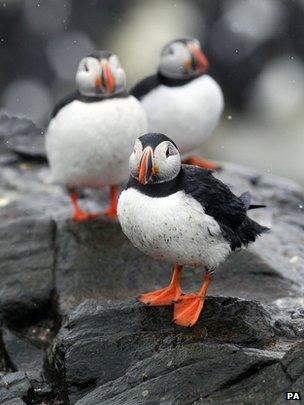Puffin census on Farne Islands shows numbers rising
- Published
Puffin numbers are on the increase but still way below their 2003 high.
Puffin numbers in a habitat in the north-east of England are making a comeback despite thousands having perished in severe winter storms.
A census on the Farne Islands, off the coast of Northumberland, showed there had been an 8% increase from the last count in 2008.
There are now just under 40,000 pairs of nesting puffins across the eight National Trust-owned islands.
But numbers are still lower than the 55,674 living on the islands in 2003.
Dozens of seabirds were washed up along the coast of north-east England and Scotland in March, with experts blaming weather conditions, as well a shortage of food.
A team of 11 rangers have been checking thousands of burrows on the Farne Islands in search of nesting puffins since May.

There are now just under 40,000 pairs of nesting puffins across the eight islands
David Steel, head ranger on the Farne Islands, said the rise in numbers was a "positive result and a step forward following worrying declines in recent years".
He added: "It comes as a real relief following some difficult years for them - with the flooding of burrows last year and a very challenging winter.
"We had feared that the numbers of puffins would be down again as has happened on other colonies, including those on the Shetland Islands.
"The bad weather during recent seasons has had some impact on numbers, but with a good nesting habitat secured by us and a plentiful supply of food in the area, numbers have been recovering pretty strongly, which is great news for the puffins and other seabirds."
As well as the puffins, the Farne Islands host thousands of grey seals along with many other types of bird, including Arctic terns, guillemots and razorbills.
- Published17 May 2013
- Published2 April 2013
- Published27 March 2013